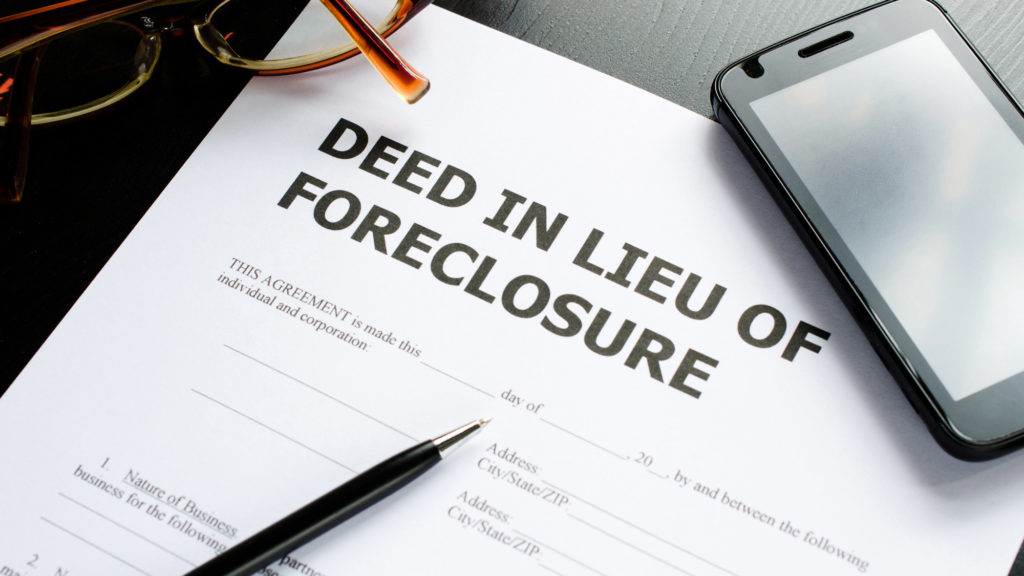As the pandemic continues to take its toll on most businesses, within the real estate industry, many property owners are being faced with decisions relating to debt foreclosures and workouts. Below is an update of a previously issued alert summarizing the potential tax implications of such transactions.
Real estate owners may currently be faced with owning properties in which the fair market value (FMV) is less than the outstanding debt. Adding to the current pandemic environment, tenants may be delinquent on their rents. Borrowers are unable to generate the necessary cash flow to service the debt, leading to their lender potentially settling the debt with a foreclosure. Foreclosures tend to be costly causing lenders and borrowers to look for alternative options to settle the debt.
One alternative to foreclosure which both lender and borrower may consider is to negotiate a settlement in which the borrower voluntarily relinquishes title to the property to the lender, and in turn, the lender agrees to stop the foreclosure. This is known as a “deed in lieu of foreclosure”. There are complex tax ramifications to this type of transaction. A key component in determining how these transactions impact tax outcomes depend on whether the loan is Nonrecourse or Recourse debt.
Deed In Lieu of Foreclosure – Nonrecourse Debt
Nonrecourse debt is a loan that is secured solely by one or more assets, and in which the borrower is not personally liable. If the debt is considered nonrecourse debt, the transaction is treated as a deemed sale. The deemed sales “proceeds” is equal to the outstanding debt balance. The debtor will realize a capital gain measured by the difference between the outstanding debt and the adjusted tax basis of the property. A deed in lieu of foreclosure transaction involving nonrecourse debt provides a more favorable Federal tax result than recourse debt since the transaction results in a capital gain subject to favorable tax rates. If a taxpayer’s cash flow permits and certain other criteria are met, one strategy to consider to defer the tax on the gain is a 1031 exchange.
Deed In Lieu of Foreclosure – Recourse Debt
Recourse debt is a loan in which the borrower is personally liable for repayment. When recourse debt is involved in a deed-in-lieu of foreclosure the transaction typically results in Cancellation of Debt (COD) income. The transfer of property is treated as a deemed sale with deemed sales “proceeds” being equal to the property’s FMV. The transaction is referred to as a “bifurcation” because two taxable transactions result from one economic event:
I. If the debt exceeds the property’s FMV, the excess is treated as COD income taxable as ordinary income, unless an exclusion applies (see below).
II. If the FMV is greater than the adjusted tax basis of the property, the taxpayer recognizes a capital gain. Conversely, if the FMV is less than the adjusted basis of the property, the taxpayer recognizes a loss.
Recourse debt can lead to a taxpayer recognizing both COD ordinary income on debt relief, as well as a gain or loss on the disposition.
Election to Exclude COD Income from Gross Income
Cancellation (or forgiveness) of debt results in taxable income to the debtor unless an exception applies. One of the most common exceptions for real estate investors applies to “qualified real property business” debt.
A taxpayer, other than a C Corporation, who is not insolvent or bankrupt, can elect to exclude COD income arising from the discharge of qualified real property business debt. Qualified real property business debt includes debt incurred in connection with real property used in a trade or business and secured by such real property. Examples of qualifying trades or businesses include rental properties, land, and improvements used in a trade or business and properties owned by the taxpayer from which their business is operated.
This election is applicable in circumstances where the lender agrees to a “haircut” (workout) on the debt. There is no disposition of property in this instance, as the owner continues to own and operate the property. The owner simply receives a reduction in the debt owed.
The election requires the tax basis of the property to be reduced by the COD income, thereby reducing future depreciation deductions. Upon the ultimate disposition of the property, however, the COD income portion retains its character and is taxed at ordinary income rates.
SUMMARY
Whether income arises from foreclosures or workouts, it is “phantom income” as no cash proceeds are received. Owners must be prepared to set aside cash for taxes owed arising from these transactions. Advanced planning and projections may highlight opportunities to minimize taxes.
Please contact your WG advisor if you have any questions or for more information regarding these types of transactions.





